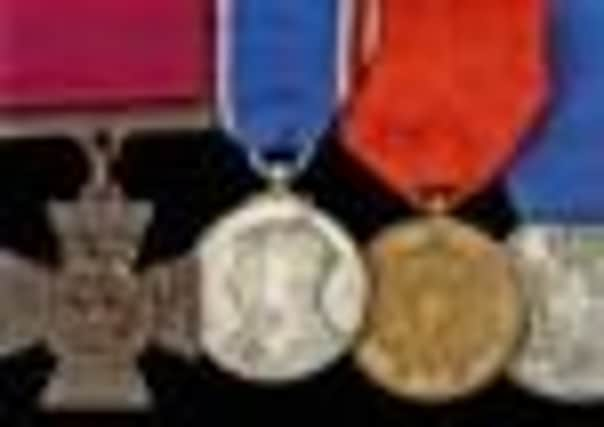Buccaneering bravery of the VC skipper


And tomorrow the Victoria Cross awarded to the heroic skipper and the courageous crew of the Gowanlea is expected to be sold for up to £160,000 when Britain’s highest medal for gallantry goes under the hammer at Spinks in London.
The medal was awarded in 1917 to Joseph Watt, a 30-year-old fishing skipper born in the Banffshire fishing village of Gardenstown, for his “most conspicuous gallantry”.
Advertisement
Hide AdAdvertisement
Hide AdIn an epic confrontation – celebrated in poetry – the brave skipper refused to surrender his 87ft wooden trawler and instead sailed headlong towards an enemy light cruiser, the 424ft Navara, the ship of Captain Miklós Horthy, later to become Regent of Hungary.
The Novara carried a crew of 318, was armed with nine 3.9in guns and 17.7in torpedoes and was protected with 2.5in of armour plating.
The Gowanlea, being used to help patrol the Straits of Otranto to prevent Austrian submarines breaking out of the Adriatic into the Mediterranean Sea, carried only a crew of eight and a dog and was armed only with a six-pounder gun.
Undeterred, Skipper Watt made straight for the enemy ship, yelling to his crew: “Three cheers lads and let’s fight to the finish!” Watt ordered his crew to open fire, but the Gowanlea was quickly disabled by four direct hits from the cruiser.
Incredibly, the Gowanlea escaped and, despite extensive damage, joined in the rescue effort to recover fishermen from other blockade vessels destroyed in the battle.
The only victim of the battle with the Novara was the boat’s terrier mascot, which never recovered from the shock of the raid and died three days later.
Watt became a national hero. But he was never comfortable with his gallantry award, telling a journalist who asked for an interview after the war: “There has been too much said already and it should get a rest…I’m ashamed to read the exaggerations which have been printed.”
Advertisement
Hide AdAdvertisement
Hide AdAt the end of the war, Watt returned to herring fishing and bought another drifter, called the Bennachie.
A spokeswoman for Spinks said: “His Victoria Cross, so bravely earned, was kept in a small drawer on his boat, amidst the accumulated junk of a sailor’s life. Joseph Watt died at home in Fraserburgh from cancer of the gullet on 13 February, 1955, and was buried alongside his wife in Kirktown Cemetery. His loss was felt all over the North-east fishing communities with deep regret.”
The Victoria Cross is being sold at Spinks auction house in Bloomsbury, together with the Italian Al Valore Militare and the French Croix de Guerre awarded to Watt for his bravery in the action in the Straits of Otranto. The lot also includes a gold pocket watch, gifted to the skipper in 1917, various newspaper cuttings and poems, and a picture of the skipper with the Duke of Kent.
Spinks has placed an estimate of between £120,000 and £160,000 on the lot.
The citation
Skipper Joseph Watt, Royal Naval Reserve.
For most conspicuous gallantry when the Allied Drifter line in the Straits of Otranto was attacked by Austrian light cruisers on the morning of 15 May, 1917. When hailed by an Austrian cruiser at about 100 yards range and ordered to stop and abandon his drifter the “Gowan Lea” Skipper Watt ordered full speed ahead and called upon his crew to give three cheers and fight to the finish. The cruiser was then engaged, but after one round had been fired, a shot from the enemy disabled the breech of the drifter’s gun. The gun’s crew, however, stuck to the gun, endeavouring to make it work, being under heavy fire all the time. After the cruiser had passed on Skipper Watt took the “Gowan Lea” alongside the badly damaged freighter “Floandi” and assisted to remove the dead and wounded.
Poem recalls the ‘David and Goliath’ battle
The HM Drifter Gowanlea
THE story of the Gowan Lea’s battle was renowned throught the North-east and was captured in poetic form, an extract of which appears below.
Four Hundred years have sped since first,
Britannia ruled the wave,
And history’s page is crowded with,
Deeds glorious and brave;
But none outshine the story fine,
Of Austrian cruisers three,
That were faced and fought by a fishing boat,
The drifter Gowanlea.
‘Neath the purple Adriatic night,
Our Scotch minesweepers lay,
When a Squadron of the foe swooped down,
Like a vulture on its prey.
“Surrender”! cried the Austrian chief;
“Surrender!, No not me;
So there, that’s flat”! bawled Skipper Watt,
Of the drifter Gowanlea!
Then his crew gave three defiant cheers,
As they made their pop-gun squirt;
Way ‘twas like ten men in armour
Against one man in his shirt!
The foe’s broadside flamed across the tide,
But the drifter, what cared she?
With her six pound shot she answered hot,
Did the tiny Gowanlea!
l From the poem HM Drifter Gowanlea by the Fraserburgh poet WR Melvin